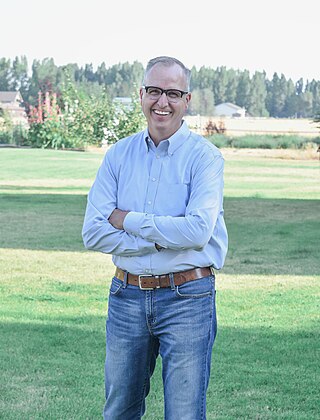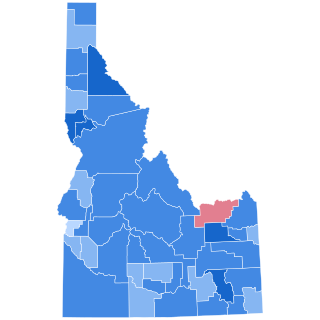
The 1972 United States presidential election was the 47th quadrennial presidential election held on Tuesday, November 7, 1972. Incumbent Republican president Richard Nixon defeated Democratic U.S. senator George McGovern in a landslide victory. With 60.7% of the popular vote, Richard Nixon won the largest share of the popular vote for the Republican Party in any presidential elections.

Super Tuesday is the United States presidential primary election day in February or March when the greatest number of U.S. states hold primary elections and caucuses. Approximately one-third of all delegates to the presidential nominating conventions can be won on Super Tuesday, more than on any other day. The results on Super Tuesday are therefore a strong indicator of the likely eventual presidential nominee of each political party.

The 2012 United States presidential election in Idaho took place on November 6, 2012, as part of the 2012 United States presidential election in which all 50 states plus the District of Columbia participated. Idaho voters chose four electors to represent them in the Electoral College via a popular vote pitting incumbent Democratic President Barack Obama and his running mate, Vice President Joe Biden, against Republican challenger and former Massachusetts Governor Mitt Romney and his running mate, Congressman Paul Ryan. Prior to the election, 17 news organizations considered this a state Romney would win, or otherwise considered as a safe red state. Romney and Ryan carried Idaho with 64.09% of the popular vote to Obama's and Biden's 32.40%, thus winning the state's four electoral votes. Romney's victory in Idaho made it his fourth strongest state in the 2012 election after Utah, Wyoming and Oklahoma. He improved on McCain's performance in 2008, expanding his margin from 25.3% to 31.69% and flipping Teton County which had previously voted for Obama.

The 2012 United States presidential election in Alabama took place on November 6, 2012, as part of the 2012 general election, in which all 50 states plus the District of Columbia participated. Alabama voters chose nine electors to represent them in the Electoral College via a popular vote pitting incumbent Democratic President Barack Obama and his running mate, Vice President Joe Biden, against Republican challenger and former Massachusetts Governor Mitt Romney and his running mate, Congressman Paul Ryan.
The following is a timeline of major events leading up to, during, and after the 2016 United States presidential election. The election was the 58th quadrennial United States presidential election, held on November 8, 2016. The presidential primaries and caucuses were held between February 1 and June 14, 2016, staggered among the 50 states, Washington, D.C., and U.S. territories. The U.S. Congress certified the electoral result on January 6, 2017, and the new president and vice president were inaugurated on January 20, 2017.

Roque "Rocky" De La Fuente Guerra is an American businessman and politician. A perennial candidate, De La Fuente was the Reform Party nominee in the 2016 and 2020 United States presidential elections. He also appeared on his own American Delta Party's presidential ticket in 2016, and on those of the Alliance Party and American Independent Party in 2020.

The 2016 United States presidential election in Virginia was held on November 8, 2016, as part of the 2016 general election in which all 50 states plus the District of Columbia participated. Virginia voters chose electors to represent them in the Electoral College via a popular vote pitting the Republican Party's nominee, businessman Donald Trump, and running mate Indiana Governor Mike Pence against Democratic Party nominee, former Secretary of State Hillary Clinton and her running mate, Virginia Senator Tim Kaine.

From March 12 to June 7, 1924, voters of the Republican Party chose its nominee for president in the 1924 United States presidential election. Only 17 states held Republican primaries that year, with most states selecting Convention delegates through caucuses and state-level conventions. Delegates chose through the primary process attended the 1924 Republican National Convention held from June 10 to June 12, 1924, in Cleveland, Ohio.

From March 7 to June 6, through a series of primaries and caucuses, voters of the Republican Party elected delegates to the 1916 Republican National Convention, held June 7 to June 10, 1916, in Chicago, Illinois to choose the party's nominee for President of the United States. The delegate election process was inconclusive, with a small plurality supporting Associate Justice of the Supreme Court Charles Evans Hughes. Hughes eventually secured the nomination on the third ballot.

Presidential primaries and caucuses of the Republican Party took place in many U.S. states, the District of Columbia, and five U.S. territories from February 3 to August 11, 2020, to elect most of the 2,550 delegates to send to the Republican National Convention. Delegates to the national convention in other states were elected by the respective state party organizations. The delegates to the national convention voted on the first ballot to select Donald Trump as the Republican Party's nominee for president of the United States in the 2020 election, and selected Mike Pence as the vice-presidential nominee.

Ronald M. Nate is an American far-right politician and economist who has previously served as a member of the Idaho House of Representatives from the 34th district. He was an economics professor at Brigham Young University–Idaho and is now president of the Idaho Freedom Foundation, a conservative think tank.

The 1936 United States presidential election in Idaho took place on November 3, 1936, as part of the 1936 United States presidential election. State voters chose four representatives, or electors, to the Electoral College, who voted for president and vice president.

The 2020 United States presidential election in Virginia was held on Tuesday, November 3, 2020, as part of the 2020 United States presidential election in which all 50 states plus the District of Columbia participated. Virginia voters chose electors to represent them in the Electoral College via a popular vote, pitting the Republican Party's nominee, incumbent President Donald Trump, and running mate Vice President Mike Pence against Democratic Party nominee, former Vice President Joe Biden, and his running mate California Senator Kamala Harris. Virginia has 13 electoral votes in the Electoral College.

The 2020 Idaho Democratic presidential primary took place on March 10, 2020, as one of several states voting the week after Super Tuesday in the Democratic Party primaries for the 2020 presidential election. The Idaho primary required that voters would be registered Democrats or unaffiliated, and awarded 25 delegates towards the 2020 Democratic National Convention, of whom 20 were pledged delegates allocated on the basis of the primary results.

Below is a detailed tally of the results of the 2020 Republican Party presidential primary elections in the United States. In most U.S. states outside New Hampshire, votes for write-in candidates remain untallied.

The 2020 Constitution Party presidential primaries were a series of primary elections determining the allocation of delegates in the selection of the Constitution Party's presidential nominee in the 2020 United States presidential election. On May 2, 2020, the Constitution Party nominated Don Blankenship for president and William Mohr for vice-president. Several state parties split from the national Constitution Party to nominate their own candidates.
This is a timeline of major events leading up to, during, and after the 2024 United States presidential election. This will be the first presidential election to be run with population data from the 2020 census. In addition to the dates mandated by the relevant federal laws such as those in the U.S. Constitution and the Electoral Count Act, several milestones have consistently been observed since the adoption of the conclusions of the 1971 McGovern–Fraser Commission.

Presidential primaries and caucuses are being held to select delegates to the 2024 Republican National Convention to determine the party's nominee for president in the 2024 United States presidential election. The Republican primaries and caucuses have taken place or will take place in all 50 U.S. states, the District of Columbia, and five U.S. territories between January and June 2024. The 2024 Republican National Convention is scheduled to be held in July at the Fiserv Forum in Milwaukee, Wisconsin.

Presidential primaries and caucuses are being organized by the Democratic Party to select the delegates to the 2024 Democratic National Convention, to determine the party's nominee for president in the 2024 United States presidential election. The elections will take place in most U.S. states, the District of Columbia, five U.S. territories, and Democrats Abroad, and will be held between January and June that year. Incumbent President Joe Biden is running for re-election with Vice President Kamala Harris returning as his running mate. On March 12, Biden secured enough delegates for re-nomination and was declared the presumptive nominee of the Democratic Party.

The 2004 Libertarian Party presidential primaries allowed voters to indicate non-binding preferences for the Libertarian Party's presidential candidate. These differed from the Republican or Democratic presidential primaries and caucuses in that they did not appoint delegates to represent a candidate at the party's convention to select the party's nominee for the United States presidential election. The party's nominee for the 2004 presidential election was chosen directly by registered delegates at the 2004 Libertarian National Convention, which ran from May 28 to 31, 2008. The delegates nominated Michael Badnarik for president and Richard Campagna for vice president.




















